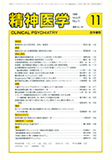Japanese
English
- 有料閲覧
- Abstract 文献概要
- 1ページ目 Look Inside
- サイト内被引用 Cited by
【抄録】 社会保険広島市民病院神経科・老人性痴呆疾患センターに来院した患者595例からアルツハイマー型痴呆(DAT)群,脳血管性痴呆(VD)群,対照群を選択,N式精神機能検査(N式)を施行し,知的評価スケールと生活環境要因との関連を検討した。対照群では「年齢」,VD群では「家庭内での役割」,DAT群では「学歴」,「同居形態」,「家庭内での役割」がN式得点の低下と関連のある要因として選択された。すなわち,DAT群では,「高学歴」,「一人暮らし」,「家庭内での役割あり」で有意に知的機能が高いという結果が示された。この結果より,DATの罹患を予防するためには,①若い時に高い教育を得ていること,②子どもと同居せず自立すること,③生活の中で自己のするべき役割があること,が重要であることが示唆された。
The present study investigated relationships between intellectual levels and psycho-social factors by comparing different types of dementia. The intellectual levels were evaluated by using the N-type dementia scale. A total of 595 patients who visited the Center for Elderly Dementia in Hiroshima City Hospital were assigned to three groups : dementia of Alzheimer type (DAT) group, vascular dementia (VD) group, and control group.
In the DAT group, those with low education, those living with children, and those having no role in the family showed a decreased intellectual level. In the VD group, those having no role in the family showed a decreased intellectual level. In the control group, the intellectual level decreased as a function of age. These findings suggested that higher education at a younger age, living alone, and having a role in the family are the most important factors to maintain the intellectual level.

Copyright © 1999, Igaku-Shoin Ltd. All rights reserved.


